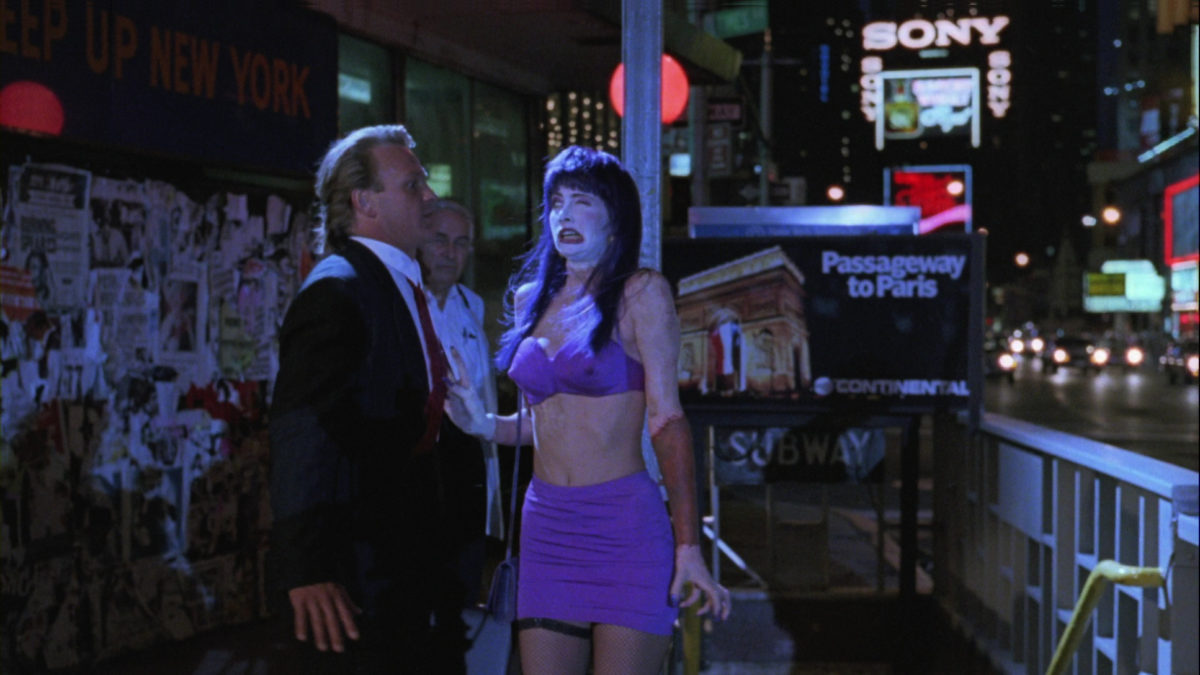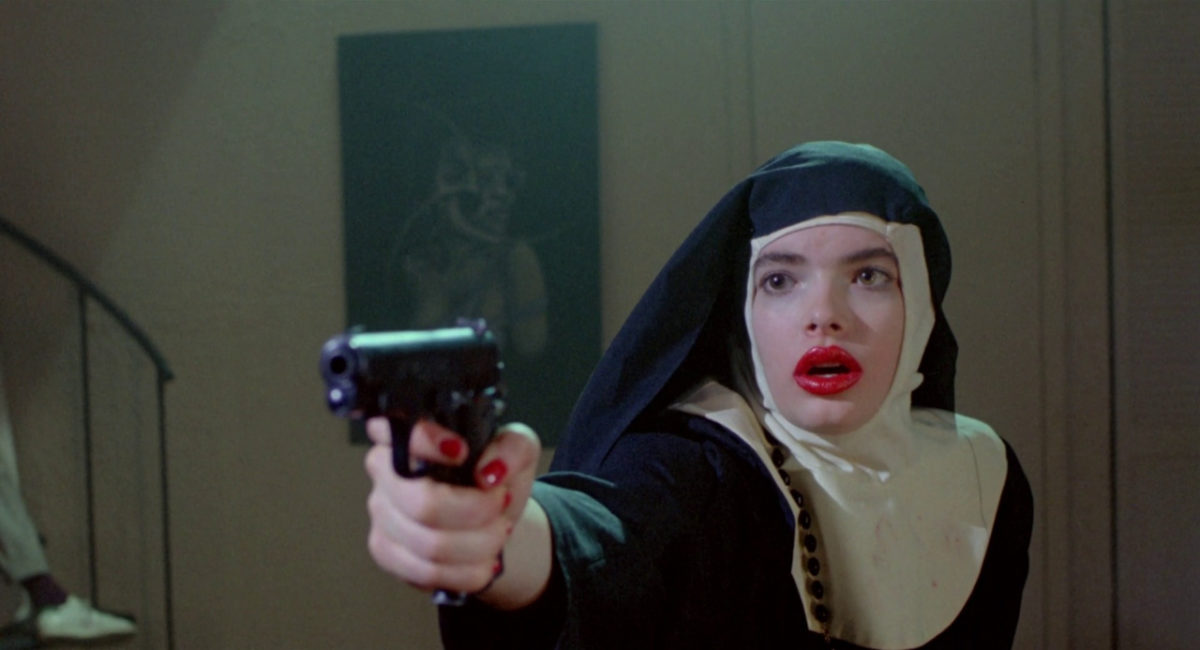Always more interested in a baroque celebration rather than a complacent sneer, Brian De Palma’s Sisters reads like a blue-collared bricolage inspired by a steady late-night TV diet: stale Hitchcock / Powell leftovers are blended to make a crude game show (the family oriented version of the gawker nudie cuties from the Grindhouse heyday), personal tragedies are exploited through mondo pieces and tabloid fodder posing as hard-hitting journalism (De Palma based his story on a Life Magazine article, as critics sheepishly noted) and the Bernard Hermann score sounds like an upscale rendition of the Vampira Show’s opening theme. Main attraction in this modern-day freak show is Danielle, an aspiring actress from Canada who’s reduced to an object of eccentricity. When taking her courteous African-American game show opponent home for a drunken one-night-stand, this soft-spoken sales manager turns into a Jimmy Stewart-esque ogler drawn to her ditzy ways and incoherent Quebecois babbling (she lacks Kim Novak’s cream-skinned radiance, her excessive white make-up resembling something that crawled out of the Universal vault instead). Danielle’s stalked by a prowling, beige trench coat wearing ex-husband who, incidentally, happens to be the surgeon that recently separated her from a conjoined twin (Dominique) and the marriage is hinted to have been based solely on Doc’s Siamese twin-fetish (the latter rubs Danielle’s mutilated scar as foreplay). We learn all about Danielle’s medical condition through a grainy hygiene film (reminiscent of the countless pseudo-educational schlockfests from the 1970s such as Let me Die a Woman, also included in the Offscreen Festival program) that illustrates both the contrast between the two girls (bright-eyed honor student Danielle versus slouched bag of misery Dominique – a subtle reference to the Nixon / Kennedy debate?) as the perverse fascination of the outside world with these exhibited rarities – a theme handled with Tod Browning-style humanism.
There is, however, a third party interested in Danielle’s misfortune: a liberal journalist named Grace Collier who desperately tries to get John Law involved after witnessing a murder in Danielle’s apartment from across the street, but who has her own (political) agenda, namely accusing the NYPD of racism. Collier goes sleuthing accompanied by a bumbling private-eye (a poor man’s Aborgast who seems to have gotten into the detective business just as an excuse to wear whacky disguises), operating from a colorful van (possible tagline: last year they solved the mystery of the haunted quarry, this year they’re fighting racial inequality!). She starts off with the enthusiasm of a leftist Nancy Drew (her bourgeois mother hoping this think pieces-fad will blow over soon), but gets a run for her money by De Palma who deliberately fogs the narrative (like TV static) with plot twists oozing ’70s conspiracy theory paranoia and who often disjoints the suspenseful pace with slapstick gags (during a dramatic highpoint, a pink frosted birthday cake is dumped on a disgruntled copper’s shoes). At the end of the film, instead of uncovering the truth, Collier decides to take a nap in her Teenybopper bedroom surrounded by Elvis posters and a Raggedy Anne doll, her silhouette slowly dissolving into the image of a stray cow being led back to the farm.

Step right up, folks! Our next attraction blatantly ignores the horror movie-hairballs those Hollywood fat cats have been regurgitating ever since Marion Crane rolled up that fateful motel driveway and takes the genre back to its proud tradition of the American carnival. Witness the cinematic wonder of Frankenhooker – a 100% guaranteed slime-fueled extravaganza! Have some barbecue and coleslaw first, then partake in the anachronistic pleasures of entering the county fair of your 1930s childhood, only now updated with modern-day circus freaks – crack whores and their fitness crazed Strongman pimps – you might recognize from Geraldo. We’ve got nine – count ’m – nine beautiful specimen handpicked from the concrete who are just aching to be detonated for your amusement (attention: people sitting in the first two rows might have some gunk splashed onto them). Bring the little ones, ma’am, this is wholesome family entertainment: no blood and guts here, just old-fashioned Fourth of July fireworks while we blow these hookers to smithereens.
Pay a visit to a spooky laboratory where your host for tonight – burlesque orator Dr. Jeffrey (we call him Groucho Marx on benzos!) – keeps a meat freezer full of strange bubbling goo, a power drill and a smorgasbord of female body parts. Watch this three-time med school dropout trying to rebuild his mangled fiancée – the lovely Elizabeth – and installing the Vitruvian streetwalker patchwork on a lightning rig, using the expertise of none other than Founding Father Benjamin Franklin. And the audience goes wild! Cheering like kids on a carousel after they’ve laid their eyes on this purple-haired, eye-twitching sideshow act.
Any refunds will be handled by Mr. Henenlotter, the park’s manager, but I’m afraid you’ll be treated to the usual answer: “Of course the haunted house is kind of dilapidated and the plastic spiders are obviously fake, but does it really matter when you’ve had a laugh or two?”

After successfully exploiting Taxi Driver’s post-Vietnam paranoia in the wonderfully shoddy The Driller Killer, Abel Ferrara’s second low-budget quickie tried to emulate the vigilante/rape and revenge genre, albeit with mixed results: Ms. 45 is a very confused little film, combining ‘tough on crime’ fear mongering from Republican Party election ads (a shot of a faceless burglar smashing an apartment window followed by an ominous piano riddle) with an inane backstory concerning a sweatshop in Manhattan’s Garment District (dig that funky catwalk music!) and an overdose of comic relief moments featuring a meddling landlady and her yelping pooch. Yet no one can deny the film’s smelly charm: like a drunken hobo, Ferrara zigzags nonchalantly through the pre-Giuliani wilderness of broken glass, soiled mattrasses and torn-up cardboard boxes, only occasionally stopping to wipe his drool-covered chin with a Lonely Planet guide (the Queensboro Bridge date from Woody Allen’s Manhattan is mimicked by a truly unsettling suicide scene) or to take a piss in a 42nd Street theatre lobby. Ferrara ridicules exploitation tropes by using overt racial stereotypes (a Jewish widow who insists on “calling Dr. Fischer” at the first sign of trouble, a jive-talking mack, Puerto Rican street thugs who must’ve found their clothes in a dumpster behind the wardrobe department of The Warriors, a greased up Tony Manero reject and a truly improbable oil sheik plummeting the film into the Z-grade abyss), indulging in simplicity by giving characters dehumanizing one-word descriptions in the end credits (such as ‘Bum’, ‘Prostitute’ or ‘Arab’) and even caricaturing the gory bits with broad sight gags (a rapist trampling a delicate flower, our avenging angel loading her shopping cart with prime rib).
And what about the irony of having a main character (Thana) who’s unable to speak and focussing exclusively on her sultry lips and unusually large mouth? Joe Delia’s saxophone score howls like a harrowing cry of hormonal rage trying to break free (linking Thana to Carrie White and Carol from Repulsion) and becomes the voice-box of this Bressonian victim. A hunted prey in the metropolitan zoo – an Escherian maze of dead-end alleys paved with catcalling gargoyles –, Thana only finds comfort in her cramped apartment, where reoccurring shots of a sliding chain lock become the visual leitmotif for her warped sense of security. The entire ordeal is filmed with disorienting close-ups of Thana’s bewildered gaze, an interesting stylistic choice which raises the question: should Ms. 45 be remembered as just a satisfactory Grindhouse piece or Ferrara’s scuzzbucket version of La Passion de Jeanne d’Arc?